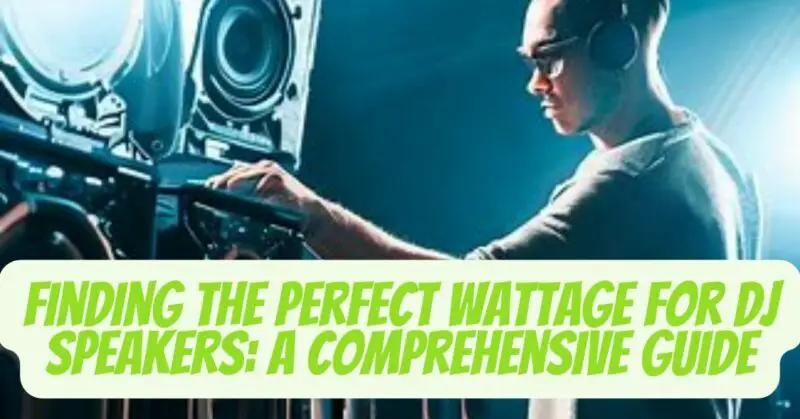When it comes to DJing, the quality and power of your sound system can make or break your performance. One critical aspect to consider is the wattage of your DJ speakers. Finding the right wattage is essential for delivering impactful and immersive sound that captivates your audience. In this article, we will explore the factors that determine how many watts you need for your DJ speakers, ensuring that you can make an informed decision and create an unforgettable experience for your listeners.
Understanding Watts and Sound
Before we dive into the specifics of DJ speakers’ wattage, let’s establish a fundamental understanding of watts and their relation to sound. Watts measure the electrical power consumed by a device, such as a speaker. In the context of audio systems, wattage indicates the speaker’s ability to handle power and produce sound.
However, the wattage alone doesn’t determine the overall sound quality. Speaker efficiency, frequency response, and other factors also play crucial roles. Therefore, it’s important to strike a balance between wattage and other specifications to achieve the desired sound reproduction.
Consider the Venue Size
One of the primary considerations when determining the appropriate wattage for your DJ speakers is the size of the venue where you’ll be performing. Larger venues require more power to fill the space with sound effectively. Smaller venues, on the other hand, demand less power as the sound waves don’t have to travel as far to reach the audience.
As a general guideline, small venues like small bars or private parties may only require 200-400 watts per speaker, while medium-sized venues such as clubs or halls might benefit from 400-800 watts per speaker. Large venues, including arenas or outdoor festivals, typically require speakers with 800 watts or more to provide adequate coverage and volume.
Consider the Genre and Intended Sound
Another important factor to consider is the genre of music you primarily play and the desired sound quality. Different genres have varying demands when it comes to sound reproduction.
If you specialize in bass-heavy genres like electronic dance music (EDM) or hip-hop, you’ll want speakers with robust low-frequency response. This often requires higher wattages and larger speaker drivers capable of handling the power and delivering deep, impactful bass.
For genres with a focus on vocals or acoustic instruments, such as jazz or folk, a more balanced sound is crucial. In such cases, wattage requirements may be lower, and emphasis should be placed on speaker clarity and accurate reproduction of mid and high frequencies.
Matching Amplifiers and Speaker Wattage
When considering speaker wattage, it’s essential to match it with a compatible amplifier. The amplifier’s wattage rating should be equal to or greater than the speaker’s power handling capacity. Mismatched amplifier and speaker wattages can result in distorted sound, blown speakers, or even damage to the amplifier.
Ensure that the amplifier and speakers are from reputable manufacturers and are designed to work together seamlessly. It’s also worth considering other amplifier features such as signal processing and built-in protection mechanisms that can enhance the overall performance and longevity of your sound system.
Conclusion
Choosing the right wattage for your DJ speakers is crucial to achieving an exceptional audio experience for your audience. Consider the size of the venue, the genre of music you play, and the desired sound quality when making your decision. By finding the right balance between wattage and other specifications, you can ensure that your DJ setup delivers powerful, immersive sound that leaves a lasting impression on your listeners.


